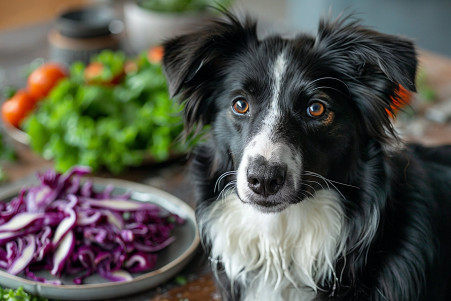Can Dogs Eat Sauerkraut? Guidelines for Fermented Foods in Canine Diets
6 February 2024 • Updated 6 February 2024

Fermented foods are becoming increasingly popular, but is sauerkraut a good fermented food to add to your dog’s diet? Sauerkraut can be fed to dogs in small amounts, and it can provide probiotics and nutrients.
However, it’s important to avoid sauerkraut that is high in sodium and that contains certain ingredients, like onions and garlic. When feeding sauerkraut to your dog, it’s best to start with small amounts and talk to your veterinarian, especially if your dog has certain health conditions, such as hypertension or kidney disease.
This article will explore the components of sauerkraut and how they can impact a dog’s health, based on veterinary nutritional studies. You’ll learn from research that investigates the pros and cons of fermented foods in a dog’s diet, specifically focusing on the impact of sodium and the benefits of probiotics.
This information will help you understand the nuances of feeding sauerkraut to dogs, so you can make the best decisions about your pet’s nutritional requirements.
Can dogs eat sauerkraut?
What Is Sodium Toxicity in Dogs?
Sodium toxicity, or hypernatremia, is a condition in which there is an abnormally high concentration of sodium in a dog’s blood. This can cause water to leave cells, leading to dehydration, and can also cause damage to the brain and nervous tissue.
It is important to know the signs of this condition, which can include vomiting, diarrhea, lethargy, and seizures, as the Pet Poison Helpline points out. This is especially dangerous for dogs because of the harmful effects of too much sodium, which can cause everything from dehydration to serious neurological problems.
While sauerkraut can be good for dogs in small amounts, it is high in salt, which can contribute to salt toxicosis. The American Kennel Club explains that dogs can recover from salt toxicosis with aggressive treatment, but it’s best to avoid it altogether. The amount of sodium in sauerkraut can far exceed the recommended amount for dogs, especially those with conditions like heart disease.
To avoid this, dog owners should rinse sauerkraut before giving it to their dogs to lower the salt content and make sure to provide plenty of fresh water. Dog owners need to be careful to make sure they don’t let their dogs consume too much salt, as the American College of Veterinary Pharmacists warns.
It’s important to manage the amount of sodium in a dog’s diet while still reaping the benefits of certain foods like sauerkraut when it’s prepared properly.
Can Dogs Have Sauerkraut for Probiotics?
Probiotics are good bacteria that live in the gut and are important for gut health and overall health. As PetMD explains, probiotics help with digestion, support the immune system, and even produce important nutrients.
For dogs, probiotics help maintain a healthy balance of bacteria in the gut, which can help with digestion and immunity. Since sauerkraut contains live cultures, it can potentially help dogs with these probiotic benefits if it’s given to them in moderation.
That said, it’s important to note that dogs have different dietary needs and digestive systems than humans, so the introduction of probiotics through food like sauerkraut may have different effects and requirements. A study published in PMC notes that while there are many benefits of probiotics for dogs, especially in terms of gut health, it’s important to remember that dogs’ digestive systems are unique and to proceed with caution.
Sauerkraut should be introduced as a probiotic source cautiously to avoid potential risks and side effects, such as dietary upset. It’s best to introduce it gradually and monitor for any negative reactions. It’s also a good idea to talk to your vet before giving your dog sauerkraut to make sure you know what probiotic sources and amounts are best for your dog’s specific health concerns.
Fermentation: Increasing Nutrient Bioavailability in Dogs
During fermentation, bacteria, yeast, and molds ferment carbohydrates to produce alcohol or lactic acid, which makes the food more digestible. For dogs, this means that fermented foods like sauerkraut have components that are “pre-digested,” so they are easier for the dog to digest and may have a higher nutrient bioavailability.
Doylestown Veterinary Hospital, a holistic pet care practice, explains that fermentation increases nutrient absorption, vitamin levels, and helps with the digestion of fats and proteins.
That said, the impact of fermented foods on a dog’s health isn’t all positive. Dogs Naturally Magazine explains that fermented foods can make yeast problems worse and lead to histamine intolerance in dogs that are sensitive to it. That’s why it’s important to know the pros and cons of fermented foods for your dog.
If you want to add fermented foods to your dog’s diet, make sure to introduce them slowly and monitor your dog’s reaction. Dairy-based ferments like kefir may be more readily accepted by pets, while fermented vegetables can have a stronger taste that dogs are less likely to enjoy. A study published in PMC found that probiotic-fermented plants can be a good addition to the diet, offering antioxidant benefits.
To make sure you’re safely adding foods like sauerkraut to your dog’s diet, it’s important to make sure they don’t contain any toxic ingredients, a topic we’ll cover as we continue to look at the role of fermented foods in dog nutrition.
How to Minimize Risks: Ingredients in Sauerkraut That Are Bad for Dogs
If you want to give your dog some sauerkraut, it’s important to avoid the toxic ingredients that are commonly found in this fermented food.
For example, according to FirstVet, garlic and onions (which are part of the Allium family) contain compounds like N-propyl disulfide that can cause oxidative damage to red blood cells, leading to hemolytic anemia. The Pet Poison Helpline also notes that all forms of garlic and onions, including raw, cooked, and powdered, are toxic to dogs, with garlic being more toxic than onions.
To ensure that the sauerkraut is safe for your dog, make sure to choose a plain, homemade version that doesn’t include these toxic ingredients.
VCA Animal Hospitals warns that garlic, onions, chives, and leeks are all potentially toxic ingredients, so it’s important to read the label of store-bought sauerkraut to make sure that none of these ingredients are included.
If your dog eats sauerkraut that contains these ingredients, you should contact your veterinarian immediately, as early treatment is important. According to the Merck Veterinary Manual, treatment may include inducing vomiting, giving activated charcoal, and providing supportive care, which may include oxygen therapy and blood transfusions if necessary.
Should You Feed Your Dog Sauerkraut?
Overall, sauerkraut can be a healthy, probiotic-rich addition to your dog’s diet if you’re careful about how you feed it to them. The most important thing to remember is that you should only feed your dog sauerkraut in moderation, as the salt in it can cause sodium toxicity.
Make sure to rinse the sauerkraut to reduce the sodium content and ensure that you’re feeding your dog an amount that’s in line with their dietary needs. In addition, the fermentation process can make the nutrients in sauerkraut more bioavailable, which can help your dog’s body absorb them more easily.
It’s also important to make sure that the sauerkraut you’re feeding your dog doesn’t contain any toxic ingredients like onions and garlic, which can be harmful to dogs. The best way to ensure that the sauerkraut you’re feeding your dog is safe is to stick to plain versions that don’t contain any of these potentially harmful additives.
On the plus side, in its most basic form, sauerkraut can help support your dog’s gut and immune health because of its probiotic properties.
As always, talk to your vet before adding any new food, including sauerkraut, to your dog’s diet. They can help you make sure that any dietary changes you make are in line with your pet’s specific health needs. If you follow these tips, you can add sauerkraut to your dog’s diet in a way that’s safe and healthy and that will help support their overall health.


